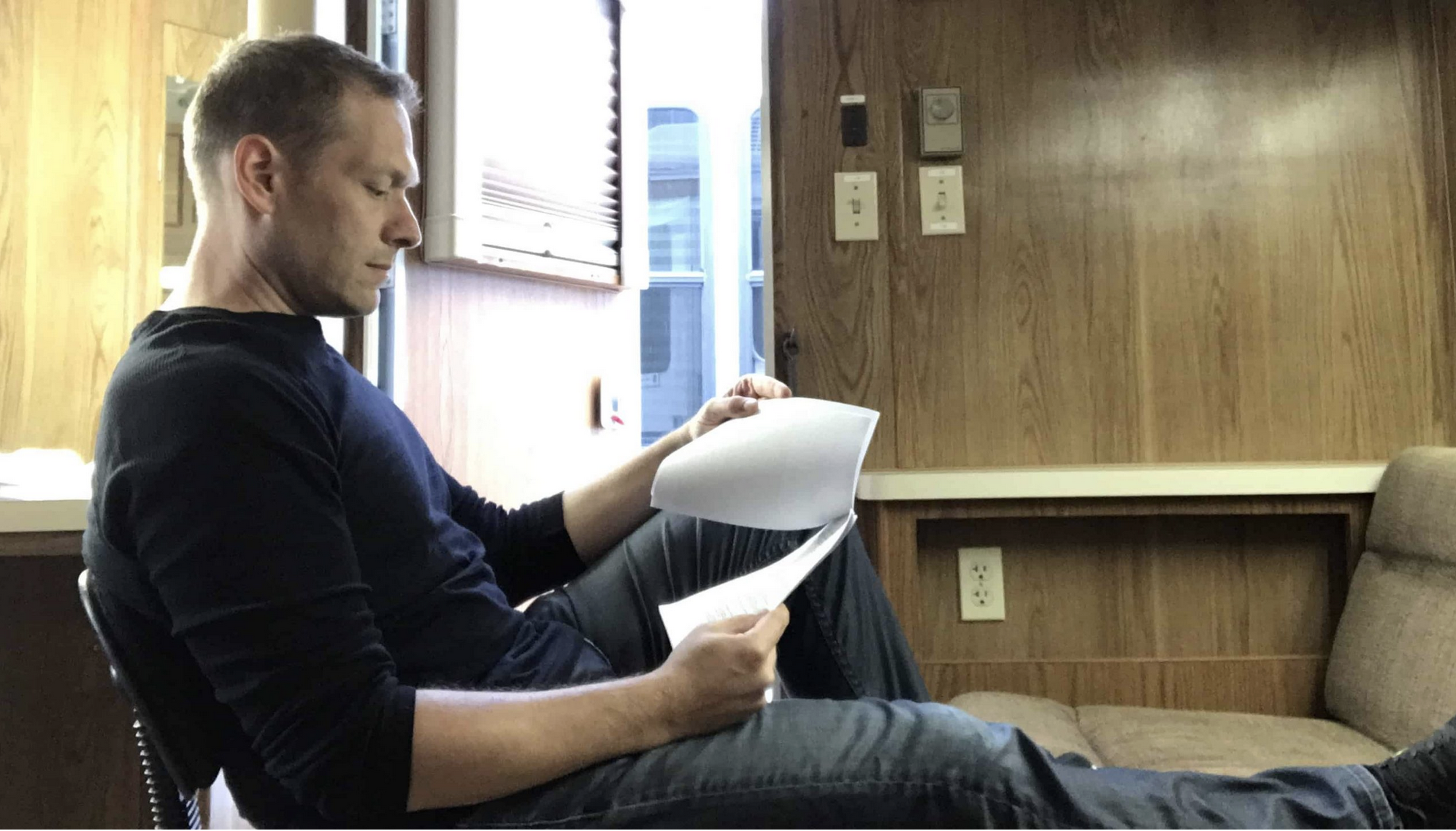If you arrived at this page by reading The Actor’s Startup Guide, welcome!
You booked a movie or TV show. Great, I’m happy for you. The dream is alive and well and coming true.
However!
You’re only halfway there. You’re hired but the second you’re wrapped, you’re fired again. Your real goal is to get hired over and over again.
Repeat business is the lifeblood of any actor’s career. Think I’ve been doing this so long by booking new work every single time? No. It’s much easier to keep a director happy than to get a new one to hire you. Repeat business keeps my confidence high and my bank accounts filled so I have the stamina to keep pursuing bigger things.
Onward and upward, as they say.
So how can you put yourself in the best position to be hired by a producer or director again and again? My flock, follow these 10 commandments and ye shall be richly rewarded.
They are listed in no particular order.
1. Thou Shalt Arrive Prepared
Honestly this should go without saying, but I’ve seen actors show up to work late, not knowing their lines, and asking the director to fill in gaps in their understanding of the story/scene/character, making it obvious the actor didn’t break down the script much, if at all. You’re a professional, remember? Part of that means doing your homework and knowing your stuff. You’re allowed to ask questions (particularly about tone and options the director may want to see) but if you can find an answer on Google, why ask it at all? Not knowing your stuff makes everybody’s day harder for no reason. Do not clog the machine that is a crew.

2. Thou Shalt Be Attentive And Observant
For crying out loud, pay attention. Don’t make people ask you for things twice. If you’re in the middle of a conversation and you hear it’s time for 1st team rehearsal, excuse yourself and get your ass to set. If you see you’re standing right where a grip is heading with a light, move out of the way and ask where you should be. The crew is working far harder than you and probably making far less, so do not get in their way.
3. Thou Shalt Not Chat
You’re outgoing, we know. You want to appear friendly and personable, sure, fine. That’s not what a set is for. No one is going to hire you again because you’re good at networking. They’re going to hire you because you behave in a way that helps grease the machine that is a crew, and you don’t clog the machine in any way. Unnecessary chatting clogs the machine. I once worked with an AD who, when you asked him a question, would tell you to rephrase it by deadpanning, “Use less words.” Good advice.
4. Thou Shalt Not Direct Other Actors
It is not your job to give your cast mates line readings or direct them in any way, at all. That is the director’s job. If you’re not getting the performance you need from another actor to play the scene convincingly, take it up with the director, not the other actor. They’ll handle it. That’s why they’re called directors. If the director asks your opinion about something, be honest but respectful of others around you.
5. Thou Shalt Not Improvise
When will actors realize that TV and film scripts are written, re-written, and jammed through a pressurized crucible of creative and legal evaluations? You’re not hired for your input. You’re hired for your ability to tell the story as it’s written. Even if you’re an improv ninja, you are not allowed to change the script unless you’re explicitly told to do so. If you think you’re funny, suppress that thought. If you think you see something incorrect in the script, disregard it. You do not know more than the writer about the subject at hand. A script is like a set of turn-by-turn directions on Waze. If you’re heading to the library but you don’t follow the directions, you’re gonna wind up at a gentleman’s club in Omaha. One caveat: If you did a kooky audition and got away with making adjustments that got you booked, ask the director if you should do those things on the day.
6. Thou Shalt Act Like You’ve Been There Before
You’re allowed to be enthusiastic about being on set. There are maybe one or two other people there who are as excited as you, but for everyone else it’s just another day at work. Over-caffeinated, chirpy wit isn’t helpful. What’s helpful is being where you’re supposed to be, on time and ready to adapt to new information and direction. And please, please, please don’t chat up the series regulars or big shot movie stars. They do not care about you. You are a necessary part of their day, but they are not going to follow you on Insta or become your BFF because you worked with them for a day or two. Ignore them unless approached.
7. Thou Shalt LISTEN
To everyone. The director, the AD’s, the DP, the producers, the PA’s, the grips, the sound department, the props people, the script supervisor, the costume department, the MU and hair crew and most importantly, to the other actors in your scene. Come in knowing your lines, but not married to one way of executing them. If you get stuck in line readings and are unable or unwilling to adjust your performance, you won’t be hired again. You’ll be pegged as a rookie who isn’t ready for the big show. And all the other people on set? They know far more than you do about where you should be, when. So follow their directions and don’t assume anything.
8. Thou Shalt Leave Your Phone In Your Trailer
Again, I can’t believe this has to be said, but phones do not belong on a film/TV set. A phone is isolating and distracting. You are part of a team, a machine. Having your nose in your phone tells the team that the phone is more important than the machine. Or rather, that you and your narcissism are more important than the team. You will not be hired again if you can’t spend a day without your phone. Also, phones are cameras and recording devices, two things that make today’s content creators very nervous. They don’t want their hard work shared prematurely by thoughtless actors trying to boost follower counts. If you see the stars or series regs on their phones, do not assume that privilege extends to you. Some sets have a strict no-phone policy, but I wish all of them did. You’re not there to be connected to the world. You’re there to be connected to the world that’s being created for others to watch after a release date.
9. Thou Shalt Not Say, “I’m sorry”. Not Even Once.
If you make a mistake, do not apologize. If you drop a line, forget part of your blocking, if a prop doesn’t cooperate, anything. Do not say you’re sorry. Apologies require acknowledgement from the offended party, which requires time and mental capacity. They have to evaluate the situation and determine whether to “forgive” your mistake by validating that you did, indeed screw up yet simultaneously let you off the hook so that you feel better about yourself. Honestly there are at least a dozen other things they’re thinking about at that moment and your feelings shouldn’t be added to the list. Mistakes happen. Know that. Saying, “I’ll get it right next time,” or asking, “How can I do that better,” is far more productive.
10. Thou Shalt Ask For Permission For Everything
Being on set is like being in 3rd grade. There’s 20-30 other students, a mountain of lessons to get through (with limited time to do them), and the teacher, who has deftly planned the day, needs the cooperation of the class to get it all done. You’re one of those third graders. You may not leave class (hit the bathroom) without permission, you may not work on something else (your Insta) while the class is doing an art project, and you have no control over the schedule (call/wrap time), agenda (shot list), or curriculum (script changes). If you don’t like your call time, if you’re hungry before lunch, if you think a line should be changed? Don’t gripe. The teacher has thought out all of those things and they are the way they are for a reason.
There should probably be at least 30 Commandments, but these are the 10 that will make you memorable for the best possible reasons.
TV and film production is an expensive, complicated business, and decision-makers do everything they can to remove as much risk from the process as possible.
If you’ve never worked with them before, you’re a risk. Showing them you’re a productive member of the team will buy you a ticket on the repeat business train since they know they won’t have to worry about you.
Work begets work, my child.


Leave a Reply
You must be logged in to post a comment.